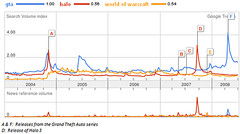By Eric Anderson, VP Business Intelligence
More and more, I hear in-game advertising mentioned along with search, display, and email as part of the digital marketing platform available for marketers to communicate with online consumers (you can throw mobile in there as well, but really that’s a variant of search and display). Yet, when compared to search and even display, in-game advertising lacks some of the compelling things that make search so, well, compelling.
- Direct Response. An important differentiator for search among all ad platforms is driving quantifiable ROIs through direct response. Upon seeing a search impression consumers can (and do) respond by clicking and interacting at the time of the impression. Current technology limits consumer’s ability to directly respond to in-game impressions. More importantly, consumers just aren’t likely to leave mid-game to respond to that impression. This makes tying any consumer response to in-game impressions difficult to capture and measure.
- Immediacy and Optimization. Since any post-impression action taken by in-game consumers is latent, assessing the impact of those impressions takes longer. Understanding how well any campaign is working therefore takes longer and limits the ability to make on-the-fly adjustments important for optimization. Search campaigns, on the other hand, can be evaluated and adjusted daily or hourly if desired.
- Engagement. Search benefits greatly from the fact that queries are user-initiated. Searchers are already vested in that subject and as a result are more open and receptive to advertiser’s message. In-game consumers are immersed in another activity (playing a game) and are actively seeking solutions or answers that can necessarily be answered by in-game messaging. Consider the volume of ads & signs lining NASCAR speedways, the drivers who are cruising along at 200 MPH aren’t looking at the ads. This is not to suggest that in-game ads don’t drive brand awareness, studies have shown that they do, but there’s additional clutter to navigate.

This chart, taken from Google Trends, shows the search activity not just at key points such as game releases, but throughout their development leading to release. - Brand Limitations. If people search for it, then brands with some relation to those searches can find paid and natural search campaigns rewarding. Search has broad appeal and application for virtually any brand, whether direct response or brand awareness driven. In-game advertising, on the other hand, doesn’t enjoy that luxury. Extreme care must be given to insure that any in-game message is contextually relevant to the game environment. For example, placing ads for Ford trucks may work in Grand Theft Auto, but would be very disruptive to say, the fantasy setting of World of Warcraft.



5 comments:
I'm a die-hard in-game advocate, but you've made some solid arguments, Eric. Well done.
wouldnt it make most sense to target gamers when they are actully gaming?
while search is not a bad option, i would think time spent looking for gaming info on the web compared to that spent playing the games themselves is just a tiny fraction.
also, not all games take place at 200mph so not sure thats the best example.
otherwise an interesting proposition but think you are missing a big piece of the puzzle here.
I would say a good way to attract a game audience is through social media--especially with respect to the "casual games" increasingly popular with different, largely female, audiences. These gamers come across games that friends and networks both on and offline recommend. Putting these games up on a site that is selling products, brands or services, increases traffic as casual gamers return to the site to play the game.
i would think time spent looking for gaming info on the web compared to that spent playing the games themselves is just a tiny fraction.
I think you may be surprised at how much time gamers spend online not playing games, but engaged in game-related content such as reading game news, finding previews and reviews, discussing games on message boards,watching gameplay movies, etc. Gaming is a very social passtime and people often connect online outside of games for a variety of reasons. Search, and more likely natural search, plays a big part in this as it helps drive gamers to specific content. Just look at all the attention being paid to the E3 conference right now. The volume of gaming related search traffic increases greatly at this time.
I think what may be more interesting for in-game advertising is less virtual billboards than sponsored in-game events such as tournaments or promotions that occur in-game that drive actions offline. Unfortunately, these options are hard to scale even though they may be effective in isolation.
Looks like Google's getting in the game http://venturebeat.com/2008/07/30/google-testing-adsense-for-games-in-bid-to-shake-up-in-game-advertising/
Post a Comment